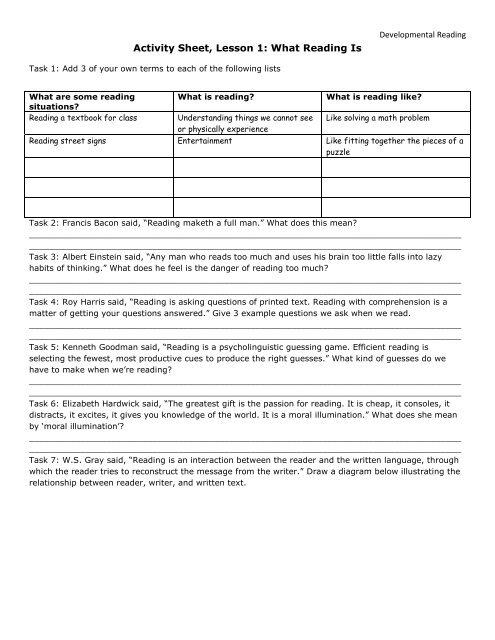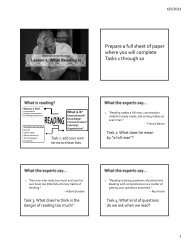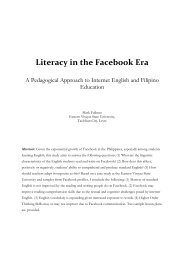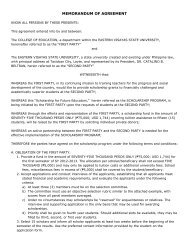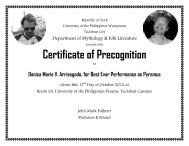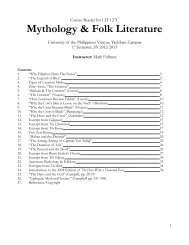Activity Sheet, Lesson 1: What Reading Is - Mark Fullmer
Activity Sheet, Lesson 1: What Reading Is - Mark Fullmer
Activity Sheet, Lesson 1: What Reading Is - Mark Fullmer
Create successful ePaper yourself
Turn your PDF publications into a flip-book with our unique Google optimized e-Paper software.
<strong>Activity</strong> <strong>Sheet</strong>, <strong>Lesson</strong> 1: <strong>What</strong> <strong>Reading</strong> <strong>Is</strong><br />
Developmental <strong>Reading</strong><br />
Task 1: Add 3 of your own terms to each of the following lists<br />
<strong>What</strong> are some reading<br />
situations?<br />
<strong>Reading</strong> a textbook for class<br />
<strong>What</strong> is reading?<br />
Understanding things we cannot see<br />
or physically experience<br />
<strong>What</strong> is reading like?<br />
Like solving a math problem<br />
<strong>Reading</strong> street signs Entertainment Like fitting together the pieces of a<br />
puzzle<br />
Task 2: Francis Bacon said, “<strong>Reading</strong> maketh a full man.” <strong>What</strong> does this mean?<br />
____________________________________________________________________________________<br />
____________________________________________________________________________________<br />
Task 3: Albert Einstein said, “Any man who reads too much and uses his brain too little falls into lazy<br />
habits of thinking.” <strong>What</strong> does he feel is the danger of reading too much?<br />
____________________________________________________________________________________<br />
____________________________________________________________________________________<br />
Task 4: Roy Harris said, “<strong>Reading</strong> is asking questions of printed text. <strong>Reading</strong> with comprehension is a<br />
matter of getting your questions answered.” Give 3 example questions we ask when we read.<br />
____________________________________________________________________________________<br />
____________________________________________________________________________________<br />
Task 5: Kenneth Goodman said, “<strong>Reading</strong> is a psycholinguistic guessing game. Efficient reading is<br />
selecting the fewest, most productive cues to produce the right guesses.” <strong>What</strong> kind of guesses do we<br />
have to make when we‟re reading?<br />
____________________________________________________________________________________<br />
____________________________________________________________________________________<br />
Task 6: Elizabeth Hardwick said, “The greatest gift is the passion for reading. It is cheap, it consoles, it<br />
distracts, it excites, it gives you knowledge of the world. It is a moral illumination.” <strong>What</strong> does she mean<br />
by „moral illumination‟?<br />
____________________________________________________________________________________<br />
____________________________________________________________________________________<br />
Task 7: W.S. Gray said, “<strong>Reading</strong> is an interaction between the reader and the written language, through<br />
which the reader tries to reconstruct the message from the writer.” Draw a diagram below illustrating the<br />
relationship between reader, writer, and written text.
<strong>Activity</strong> <strong>Sheet</strong>, <strong>Lesson</strong> 2: Significance of <strong>Reading</strong><br />
Developmental <strong>Reading</strong><br />
Task 1: Recall from the previous lesson the components of reading, and fill up the pyramid, below:<br />
<strong>Reading</strong> Comprehension<br />
Task 2: After reading the passages provided in the chapter, make a list of 10 reasons why reading is<br />
significant (i.e., what benefits does it have?).<br />
1. ____It stimulates the muscles of the eyes____________________________________________<br />
2. _____________________________________________________________________________<br />
3. _____________________________________________________________________________<br />
4. _____________________________________________________________________________<br />
5. _____________________________________________________________________________<br />
6._____________________________________________________________________________<br />
7. _____________________________________________________________________________<br />
8. _____________________________________________________________________________<br />
9. _____________________________________________________________________________<br />
10. ____________________________________________________________________________
<strong>Activity</strong> <strong>Sheet</strong>, <strong>Lesson</strong> 3: Factors Affecting <strong>Reading</strong><br />
Task 1: Fill up the chart, giving examples of each reading factor<br />
Developmental <strong>Reading</strong><br />
Physical & Clinical Factors<br />
Predictors of School Entry<br />
Acquired Knowledge of<br />
Literacy<br />
Family-Based Factors<br />
Hearing problems, eyesight, motor skills<br />
School, Neighborhood, &<br />
Community Factors<br />
Task 2: Use the list above and recall Elena Cutiongco‟s 5 causes for problems in education. Then explain<br />
the factors involved in each situation below:<br />
Scenario<br />
Sean is 10 years old. After school, he immediately<br />
faces the computer and plays games. Whenever his<br />
mom sees him, she always ignores what he‟s doing.<br />
When the issuance of report cards come, Sean<br />
receives poor marks in the major subjects,<br />
particularly reading.<br />
Mae is in Mr. Bernardo‟s Grade 5 class. She has had<br />
difficulty in learning to read. Even in the second<br />
grade she only reads about the preschool level.<br />
When asked about the print materials she prefers to<br />
read, she said she liked playing with dolls and<br />
browsing fashion magazines. She also said that her<br />
brothers play loud music and home.<br />
Renz was more in Cebu and migrated to Manila. He<br />
is now in Grade 4 and is reading in English at about<br />
the 3 rd level. Although he can understand English<br />
and uses it occasionally, he still prefers to speak<br />
Filipino. His teachers in other subjects report that<br />
Renz sometimes lags behind, not only in reading<br />
but also in speaking, listening, and writing.<br />
Kent comes from a dysfunctional family. In school,<br />
his teachers always complain that he is mischievous<br />
and that he oftentimes daydreams, too, during class<br />
hours. He doesn‟t like to finish his seatwork. When<br />
his mom is called for a conference, she exclaims<br />
that at home he does not read.<br />
When Raul was 5, his parents noticed that he could<br />
hardly utter a word. He could not understand what<br />
people were saying, either. When he was enrolled<br />
as a preschooler, his teacher would normally send<br />
him home since he could not cope with the<br />
demands of his schoolwork.<br />
Explanation<br />
I think the two main problems in this example are (1)<br />
the interest of kids in computer games today and (2)<br />
family based factors. Sean does not have the proper<br />
attitude for school yet, and his family is not helping<br />
change that attitude.
<strong>Activity</strong> <strong>Sheet</strong>, <strong>Lesson</strong> 4: Factors Affecting <strong>Reading</strong><br />
Developmental <strong>Reading</strong><br />
Task 1: Fill up the chart, below, of Developmental <strong>Reading</strong> Stages. Do NOT simply copy the description.<br />
Instead use your own words so you fully understand the meaning.<br />
Stage<br />
Stage 0: Pre-<strong>Reading</strong><br />
Description<br />
Children in this stage are learning about the alphabet, and things like how words can<br />
represent things. They cannot yet read words or sentences.<br />
Stage 1:<br />
Stage 2:<br />
Stage 3:<br />
Stage 4:<br />
Stage 5:<br />
Task 2: Fill up the chart, based on the Three Major Stages of Skills Development<br />
Major Stage<br />
1. <strong>Reading</strong> Readiness<br />
Description<br />
2. Beginning <strong>Reading</strong><br />
A. Print awareness<br />
B. Phonemic awareness<br />
C. Phonics<br />
D. Vocabulary<br />
E. Fluency<br />
F. Comprehension<br />
3. Independent <strong>Reading</strong>
<strong>Activity</strong> <strong>Sheet</strong>, <strong>Lesson</strong> 5: Developmental <strong>Reading</strong> Program<br />
Developmental <strong>Reading</strong><br />
Task 1: The book provides a “Skills Ladder” for the steps readers take, from basic to complex, in the<br />
reading process. Create your own Skills Ladder for your major subject which lists tasks from simple at the<br />
bottom to complex at the top.<br />
Your major subject: ____________________<br />
Skills Ladder<br />
Most Complex<br />
Most Basic<br />
Task 2: Write a brief description of each of the following Components of a Balanced Literacy Program. Do<br />
NOT simply copy, but rather write in your own words so you will fully understand.<br />
1. <strong>Reading</strong> Aloud<br />
2. Shared <strong>Reading</strong><br />
Component<br />
Description<br />
<strong>Reading</strong> aloud is when the teacher reads and students<br />
listen. This is good for modeling pronunciation and<br />
emphasis.<br />
3. Guided <strong>Reading</strong><br />
4. Independent <strong>Reading</strong><br />
5. Writing Aloud<br />
6. Shared Writing<br />
7. Guided Writing<br />
8. Independent Writing
Bottom-Up<br />
Processing<br />
Top-Down<br />
Processing<br />
Developmental <strong>Reading</strong><br />
<strong>Activity</strong> <strong>Sheet</strong>, <strong>Lesson</strong> 6: Developmental <strong>Reading</strong> Program<br />
Task 1: Create a chart showing the differences between Bottom-Up and Top-Down processing. Fill up<br />
elements in order (for example, “personal experience, “sentences”, “main ideas”, “individual words”)<br />
Task 2: Read the following paragraph. Then create 2 Bottom-Up, 2 Top-Down, and 2 Interactive<br />
processing questions.<br />
“Throw out the bottles and boxes of drugs in your house. A new theory suggests that medicine could be<br />
bad for your health, which should at least come as good news to the people who cannot afford to buy<br />
expensive medicine. However, it is a blow to the medicine industry, and an even bigger blow to our<br />
confidence in the progress of science. This new theory argues that healing is at our fingertips: we can be<br />
healthy by doing Reiki on a regular basis. In quantum physics, energy is recognized as the fundamental<br />
substance of which the universe is composed. Reiki depends on the energy within our bodies. It is a<br />
simple and effective way of restoring the energy flow. There are no side effects and it is scientifically<br />
explained.”<br />
Bottom-Up:<br />
1. According to quantum physics, what is energy?<br />
2.<br />
Top-Down:<br />
1.<br />
2.<br />
Interactive:<br />
1.<br />
2.
<strong>Activity</strong> <strong>Sheet</strong>, <strong>Lesson</strong> 7: Levels of Comprehension<br />
Task 1: Read the following story, then answer the questions.<br />
Developmental <strong>Reading</strong><br />
“At a rest stop, I went to…you know DROP A LOAD…Weeelllll I was barely sitting down when I heard a<br />
voice from the other stall saying: “Hi, how are you?” I‟m not the type to start a conversation in the men‟s<br />
restrooms at a rest stop but, I don‟t know what got into me, so I answered, somewhat embarrassed,<br />
“Doin Just Fine!” And the other guy says: “So what are you up to?” <strong>What</strong> kind of question is that? At that<br />
point, I‟m thinking this is too bizarre so I say: “Uhhh I‟m like you, just traveling east!” At this point I am<br />
trying to get out as fast as I can when I hear another question. “Can I come over to your place after a<br />
while?” Ok, this question is just wacky but I figured I could just be polite and end the conversation. I tell<br />
him, “Well, I have company over so today is a bad day for me!” Then I hear the guy say<br />
nervously…”Listen Tito, I‟ll have to call you back. There‟s an idiot in the other stall who keeps answering<br />
all my questions!”<br />
1. Where does the story take place?<br />
2. Who is the other guy talking to?<br />
3. <strong>What</strong> could “Drop a load” mean?<br />
4. Why does the man keep on answering the other guy‟s questions?<br />
5. <strong>Is</strong> the story meant to be funny or educational?<br />
6. Have you ever been in a similar situation?<br />
7. <strong>What</strong> other kinds of misunderstanding do we have in conversations?<br />
Task 2: Explain the differences between the different Levels of Comprehension<br />
Level<br />
Explanation<br />
1. Literal<br />
2. Interpretive<br />
3. Applied
<strong>Activity</strong> <strong>Sheet</strong>, <strong>Lesson</strong> 8: Comprehension Strategies<br />
Developmental <strong>Reading</strong><br />
Task 1: Complete the following chart. Give 2 example activities for the various <strong>Reading</strong> Comprehension<br />
Strategies.<br />
Strategy<br />
Skimming<br />
Example Activities Using the Given Strategy<br />
1) Have students read a newspaper and then identify the main point<br />
2) Have students skim a whole textbook in 2 minutes, then summarize.<br />
Scanning<br />
Extensive <strong>Reading</strong><br />
Intensive <strong>Reading</strong><br />
Visualizing<br />
Monitoring & Repairing<br />
Understanding<br />
Determining Important<br />
Ideas<br />
Using Background<br />
Knowledge<br />
Questioning
Task 1: Fill in the blanks<br />
<strong>Activity</strong> <strong>Sheet</strong>, <strong>Lesson</strong> 9: Expanding Your Vocabulary<br />
Developmental <strong>Reading</strong><br />
1. Studies show that students need to understand ____% of the words they read for comprehension<br />
2. Researchers believe students need to know at least ________ words for them to effectively transfer<br />
learning from their mother tongue to a second language.<br />
3. Vocabulary knowledge = knowledge of a defintion + _____________________________________<br />
Task 2: Label the following vocabulary learning strategies with one of the following five labels:<br />
DET = Determination<br />
SOC = Social<br />
MEM = Memory<br />
COG = Cognitive<br />
MET = metacognitive<br />
______ 1. Asking a teacher for a translation<br />
______ 2. Looking up a word in a dictionary<br />
______ 3. Watching an English-language movie<br />
______ 4. Grouping words spatially on a page<br />
______ 5. Having a conversation with a native speaker<br />
______ 6. Analyzing word roots and affixes to understand its meaning<br />
______ 7. Connecting a new vocabulary word to a personal experience<br />
Task 3: Use all the different vocabulary learning strategies to learn the meaning of the following words<br />
(i.e., for one word, ask a teacher for a translation, for another try to remember it by drawing a picture,<br />
etc.)<br />
1. Benevolent ________________________<br />
2. Hydrophobia _______________________<br />
3. Verisimilitude _______________________<br />
4. Imposition __________________________<br />
5. Obviate ____________________________<br />
6. Gregarious _________________________<br />
7. Taciturn ___________________________
<strong>Activity</strong> <strong>Sheet</strong>, <strong>Lesson</strong> 10: Word Roots<br />
Developmental <strong>Reading</strong><br />
Task 1: Give additional examples of words in English containing the root word<br />
ROOT MEANING EXAMPLES<br />
PORT CARRY Portable, transport, export, import<br />
DICT SAY Diction….<br />
RUPT BREAK Disrupt…<br />
SCRIB WRITE Inscribe…<br />
MED MIDDLE Intermediate…<br />
PED/POD FOOT Pedestrian…<br />
TEMP TIME Temporary…<br />
BENE GOOD Beneficial…<br />
CRED BELIEVE Credible…<br />
DOM HOME Domestic…<br />
PATER FATHER Paternity…<br />
TRACT DRAG/PULL Tractor…<br />
SPECT LOOK Inspect…<br />
STAT/STA NOT MOVING Stationary…<br />
Task 2: Guess the meaning of each of these fears, using the root meaning to help you.<br />
WORD ROOT MEANING<br />
HYDROPHOBIA WATER Fear of…<br />
ACROPHOBIA HIGH Fear of…<br />
CLAUSTROPHOBIA CLOSED Fear of…<br />
AGORAPHOBIA GROUP Fear of…<br />
XENOPHOBIA FOREIGN Fear of…<br />
HOMOPHOBIA MAN Fear of…<br />
HEMOPHOBIA BLOOD Fear of…<br />
Task 3: Write the root word contained in each group of English words. An example answer is given.<br />
1. Mimicking, mimcry, mimic: mim, “to imitate”____________<br />
2. Mystify, mystic, mystical: ________________________<br />
3. Dermatology, dermatitis, epidermis: ________________________<br />
4. Structures, destruction, instructing ________________________<br />
5. Malcontent, malicious, malignant ________________________<br />
6. Bible, bibliography, bibliographical ________________________<br />
7. Infinite, Finiteness, Infinitive ________________________<br />
8. Synchronize, chronology, chronic ________________________<br />
9. Vacuum, evacuate, vacant ________________________<br />
10. Auditorium, audience, audiovisual ________________________
Developmental <strong>Reading</strong><br />
<strong>Activity</strong> <strong>Sheet</strong>, <strong>Lesson</strong> 11: Affixes<br />
Task 1: A morpheme is the smallest unit of language that has meaning. For example, the word “prefix”<br />
contains two morphemes: pre, and fix. <strong>What</strong> is the difference between “phonemes” and “graphemes”?<br />
_______________________________________________________________________________<br />
_______________________________________________________________________________<br />
Task 2: Encircle all the prefixes or suffixes in the song, “The Impossible Dream”<br />
To dream the impossible dream<br />
To fight the unbeatable foe<br />
To bear with unbearable sorrow<br />
To run where the brave dare not go<br />
To right the unrightable wrong<br />
To love pure and chaste from afar<br />
To try when your arms are too weary<br />
To reach the unreachable star<br />
This is my quest<br />
To follow that star<br />
No matter how hopeless<br />
No matter how far<br />
To fight for the right<br />
Without question or pause<br />
To be willing to march into Hell<br />
For a heavenly cause<br />
And I know if I'll only be true<br />
To this glorious quest<br />
That my heart will lie peaceful and calm<br />
When I'm laid to my rest<br />
Task 3: Give the meaning of the suffix listed. An example answer is given for the first suffix.<br />
Suffix Meaning Examples<br />
able, ible able to be, capable of being pourable, drinkable, readable,<br />
washable, curable, visible, flexible<br />
ance, ancy<br />
performance, reliance, defiance,<br />
radiance, acceptance, ascendancy,<br />
discrepancy, infancy<br />
ator<br />
dom<br />
ee<br />
er, or<br />
terminator, culminator, agitator,<br />
instigator, generator, incubator,<br />
accelerator, invigorator, elevator<br />
kingdom, freedom, wisdom,<br />
sheikdom, fiefdom, sheikdom<br />
payee, mortgagee, employee,<br />
appointee, abductee, examinee<br />
driver, hiker, reader, manager,<br />
polisher, speaker, counselor,<br />
author, creator, director, sculptor
Developmental <strong>Reading</strong><br />
<strong>Activity</strong> <strong>Sheet</strong>, <strong>Lesson</strong> 12: Antonyms<br />
Task 1: Fill in words in between the two gradable antonyms listed. An example is given for the first.<br />
Boiling<br />
Hot Happy Wet Rich<br />
Warm<br />
Cool<br />
Cold Sad Dry Poor<br />
Freezing<br />
Task 2: Give 5 examples of relational antonyms<br />
1.<br />
2.<br />
3.<br />
4.<br />
5.<br />
Task 3: Study the following auto-antonyms<br />
WORD MEANING 1 MEANING 2 SAMPLE SENTENCE<br />
BOLT RUN AWAY FASTEN That horse will bolt from the stable unless<br />
you bolt him to the lock.<br />
CUSTOM COMMON HABIT<br />
SPECIAL/<br />
UNIQUE<br />
It is custom in Tacloban to buy custom-made<br />
boots.<br />
LEFT REMAINING GONE AWAY Mae Ann was the only person left on campus after<br />
everyone left.<br />
BILL<br />
BOUND<br />
SOMETHING TO<br />
PAY<br />
TO GO<br />
SOMEWHERE<br />
MONEY Joeboy paid for his bill at Stephanie‟s with a ₱1000<br />
bill.<br />
TO BE HELD<br />
SOMEWHERE<br />
LAST Ending Going on for a long<br />
time<br />
Maricor was bound for Manila, but she was bound<br />
to her work in Tacloban.<br />
My last ₱500 needs to last me until Sunday.<br />
MAD ANGRY IN LOVE WITH Even though Roderick was mad at his girlfriend, he<br />
was still mad about her.<br />
Task 4: List an antonym for each of the words below:<br />
1. Obvious ______________________<br />
2. Talkative ______________________<br />
3. <strong>Is</strong>olation ______________________<br />
4. Humility ______________________<br />
5. Wrath ______________________<br />
6. Congested ______________________<br />
7. Artificial ______________________<br />
8. Rational ______________________
Developmental <strong>Reading</strong><br />
<strong>Activity</strong> <strong>Sheet</strong>, <strong>Lesson</strong> 13: Synonyms<br />
Task 1: Explain the difference between the following pairs of synonyms<br />
• individual / human Individual is more general because it can refer to things besides humans<br />
• student / pupil _________________________________________________<br />
• ugly / unattractive _________________________________________________<br />
• sick / ill _________________________________________________<br />
• teacher / instructor _________________________________________________<br />
Task 2: For each of the following groups, encircle the word that is NOT a synonym.<br />
1. When my love rejected my marriage proposal, I was filled with torment.<br />
2. The prisoners were suffering in the overcrowded and unsanitary jail<br />
3. The teacher was distressed when most of her students failed the exam.<br />
4. The man with pancreatic cancer had a terminal illness.<br />
1. The universe is a constant storm of celestial chaos.<br />
2. The teacher‟s lecture was unorganized and full of disorder.<br />
3. The protesters roamed the streets, bringing mayhem to Manila.<br />
4. After I applied for the job, I received a rejection letter.<br />
1. Don‟t touch that wall because the paint is still wet.<br />
2. Because it was raining and I had no umbrella, my clothes became sodden.<br />
3. My forehead was damp with perspiration.<br />
4. I didn‟t put the flowers in water and now they have wilted.<br />
1. The restaurant offers bottomless soft drinks.<br />
2. Manila is becoming more populous every year.<br />
3. The subterranean cave was full of bats.<br />
4. My philosophy teacher is full of profound ideas.<br />
5. The Pacific Ocean is very deep.
<strong>Activity</strong> <strong>Sheet</strong>, <strong>Lesson</strong> 14: Context Clues<br />
Developmental <strong>Reading</strong><br />
Task 1: Study the Chart below, listing the different types of context clues. Then, based on the sentence,<br />
give a definition of the underlined word.<br />
Context Clue Sample sentence Meaning of Word<br />
Example<br />
“Biodegradable materials like<br />
leftover foods, fruit peelings, and<br />
plant leaves must be separated<br />
Biogradable means things that do<br />
decompose.<br />
from those that do not decompose.”<br />
Comparison<br />
“The taciturn student is like a<br />
mute television.”<br />
Contrast<br />
Inference<br />
Synonym<br />
Definition<br />
Explanation<br />
“In March, the weather is pacific,<br />
unlike the stormy weather during<br />
the months of June and July.”<br />
“The OFW is well remunerated for<br />
his work. He receives PHP 50,000<br />
every month.”<br />
“Poems written by Andress Mojica<br />
are usually unfathomable. Many<br />
cannot understand the message he<br />
wants to convey.”<br />
“A philatelist is someone who<br />
collects different kinds of stamps.”<br />
“The stratification of society<br />
makes clear distinctions between<br />
the rich and poor. The level<br />
occupied by the rich is far from the<br />
position the poor people hold.”
<strong>Activity</strong> <strong>Sheet</strong>, <strong>Lesson</strong> 15A: Idioms<br />
Developmental <strong>Reading</strong><br />
Task 1: Study the following list of idioms used in sentences, then guess their meanings<br />
Sentence with Idiomatic Expression (underlined)<br />
Life is good. Everything is A-OK!<br />
You seem to be thinking. A penny for your thoughts?<br />
My father always advised me that a penny saved is a penny earned.<br />
Stop trying to explain in words. A picture is worth a thousand<br />
words.<br />
I bought a poor man's version of a videoke machine and now it's<br />
broken.<br />
That Gucci dress cost me a pretty penny.<br />
Don't worry. I'll help. A problem shared is a problem halved.<br />
The Achilles heel of Mano Renie was his love for gambling at cock<br />
fights.<br />
The true acid test of whether you understand English is if you can<br />
speak.<br />
The committee made across the board changes to the budget.<br />
Only an act of God can save us from this horrible storm now.<br />
Don't trust that speaker. Actions speak louder than words.<br />
I have no preference for dinner tonight. The ball is in your court.<br />
If you don't know the exact population, can you give a ballpark<br />
figure?<br />
I learned how to swim through trial by fire.<br />
I am exhausted. Let's call it a day and go home.<br />
Minutes before the angry debate, there was a calm before the<br />
storm.<br />
We shouldn't pass the RH Bill. It is opening a whole can of worms.<br />
The president was something of a dark horse before the election.<br />
I was interviewed on television finally. I've had my day in the sun.<br />
If you keep smoking, your days are numbered.<br />
Thanks for the 50 pesos, but it's only a drop in the bucket for my<br />
debts.<br />
If you argue with him about the budget, it will only add fuel to the<br />
fire.<br />
The principal seems mean, but he is all bark and no bite.<br />
If you think you might say something offensive, bite your tongue.<br />
He never came on time. This morning, as usual, he was late<br />
At last, my son made it to the top ten.<br />
To achieve his goal, he prayed to St. Augustine over and over.<br />
The Philippines will take part in the next global summit.<br />
The president assigned secretary Diaz to be in charge of the<br />
conference<br />
The cancer cells in her body are killing her little by little<br />
At times, I think about why I broke up with my girlfriend.<br />
Mrs. Martin visits her parents in Manila once in awhile.<br />
Meaning<br />
things are absolutely fine<br />
a way of asking someone what they are thinking.<br />
we shouldn't spend or waste money but should<br />
try to save it<br />
visual images can oftentimes explain things better<br />
than writing<br />
a version of something that is not as good, or low<br />
quality<br />
very expensive<br />
if you talk about your problems it will make you<br />
feel better<br />
a person's weak spot, or vulnerability<br />
a way of proving whether something is good or<br />
real<br />
something that applies to everybody<br />
something that happens that no human can<br />
control<br />
what people do is more important than what they<br />
say<br />
the decision is up to you<br />
an estimate or approximate answer<br />
learning something by doing it directly, usually in<br />
a difficult situation<br />
another way of saying you're finished<br />
a peaceful time right before something goes<br />
wrong<br />
a big problem or challenge<br />
someone who is mysterious<br />
a moment of fame and attention<br />
expected to die soon<br />
something that only contributes a little to a very<br />
big problem<br />
to make a bad situation even worse<br />
someone who seems mean but really has no<br />
power<br />
avoid talking<br />
as always, customarily<br />
finally<br />
repeatedly<br />
participate<br />
to lead or supervise<br />
gradually, slowly<br />
sometimes/occasionally (usahay)<br />
sometimes/rarely (talagsa)
Developmental <strong>Reading</strong><br />
<strong>Activity</strong> <strong>Sheet</strong>, <strong>Lesson</strong> 15B: Figurative Language<br />
Task 1: Complete the following sentences using the specified figurative language.<br />
1. The pianist played the Beethoven sonata like ___________________________________________.<br />
[simile for something beautiful or perfect]<br />
2. When it comes to cooking, Ma‟am Tanala is a ___________________________________________.<br />
[metaphor for terrible or incompetent]<br />
3. ___________________________ attacked loyalist forces in Libya in an attempt to protect the rebels.<br />
[metonymy for the American government]<br />
4. 4,000 ________________________ marched through the muddy swamps of Balangiga.<br />
[synecdoche for soldiers]<br />
5. Oh unpredictable rain, why ________________________________________________?<br />
[apostrophe for rain not stopping]<br />
6. The __________________ jeepney used 2 liters of gasoline for every 10 kilometers it travelled.<br />
[personified adjective for consuming fuel]<br />
7. Justin Bieber is _____________________________________________________.<br />
[Overstatement for Justin Bieber‟s singing talent]<br />
8. Shamsey Supsup is __________________________________________________.<br />
[Understatement for Supsup‟s beauty and grace]<br />
Task 2: Study the following examples of synecdoche and metonymy to understand these very difficult<br />
figurative language devices.


